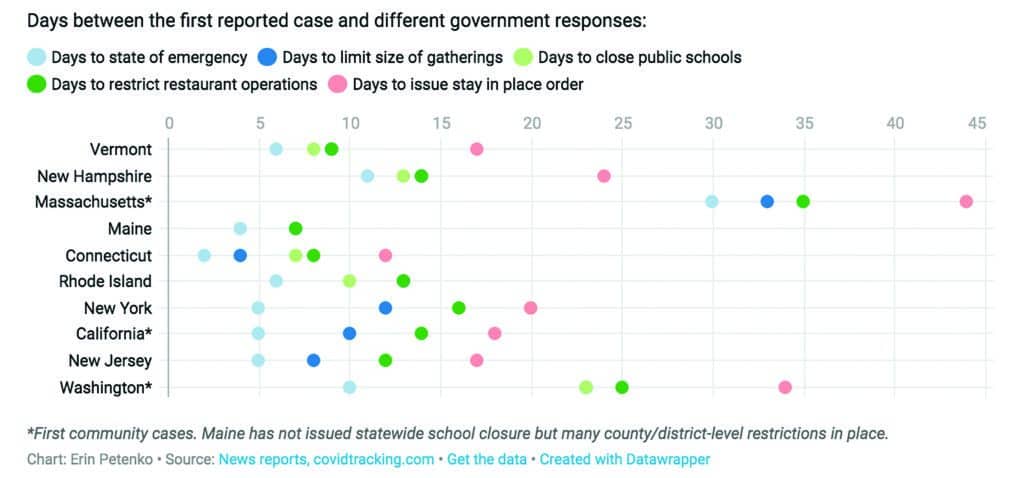
By Erin Petenko and Xander Landen/VTDigger
Vermont Gov. Phil Scott issued a “stay home” order on March 24 (effective March 25), then strengthened that order on March 30 with 14-day self-quarantining measures for those traveling in from outside the state. It’s the latest in a series of closures, bans and restrictions intended to keep people at home, away from the risk of spreading COVID-19.
He’s not the only governor taking strong action to combat the epidemic.
Every state in New England has imposed rules on the size of gatherings and limited restaurant use. Deeper analysis has found that on the whole, Vermont timed its increasing closures at the same time or earlier than its neighbors.
In many cases, Vermont announced changes on the same day as New Hampshire.
Both declared a state of emergency on March 13, closed public schools on March 15, and limited the size of gatherings on March 16.
Then, the Green Mountain State’s stay-at-home order came two days earlier than the Granite State. Compared to the date of both states’ first cases, Vermont was ahead in taking action — borrowing from the steps that states further along in their outbreaks had taken.
Both Vermont and New Hampshire were faster in taking action than Massachusetts, where cases had appeared far earlier. It was one of the first states to report cases in February.
“The beauty of our federal system is that each state can take action without necessarily endangering the actions of the other,” said Jared Carter, a Vermont Law School professor. “And that doesn’t work perfectly in the context of a pandemic because obviously a virus knows no border, but it does allow us to learn from each other and improve.”
Dr. Tim Lahey, an infectious disease physician at UVM Medical Center, said that the differences between many states responding to the crisis including Vermont, New York and Massachusetts are “generally subtle.”
But some states in the South stand out for reacting to the virus more slowly, he said.
He commended Scott’s response to the virus in Vermont. “I think he’s made a call to action and I think he’s tried to base his recommendations on science,” Lahey said. “So I think he’s been doing the best he can with the resources he has.”
Lahey said that in general the United States did not act fast enough to prevent the spread of COVID-19 when it first learned of it in January.
He pointed to South Korea, which has done a better job of slowing the spread. The government there has prioritized aggressive testing and conducted contact tracing for those who were infected earlier.
Ideally, “stay-in-place” orders would have come down when governments initially detected community spread. Lahey said that state governments are reaching the limits of what they can do to combat the pandemic, and that now the federal government — and the military in particular — needs to step up to help hospitals build surge capacity.
Last week, the Vermont National Guard set up medical “surge” sites in Burlington, Barre and St. Albans and this week added a pop-up testing location in Putney to help hospitals manage an anticipated influx of patients. However, Lahey said a bigger response is likely needed. “It’s great to see the National Guard getting involved, but I suspect without a huge wartime mobilization of the size of World War II in Europe that bad things are going to happen in cities around the country.”




